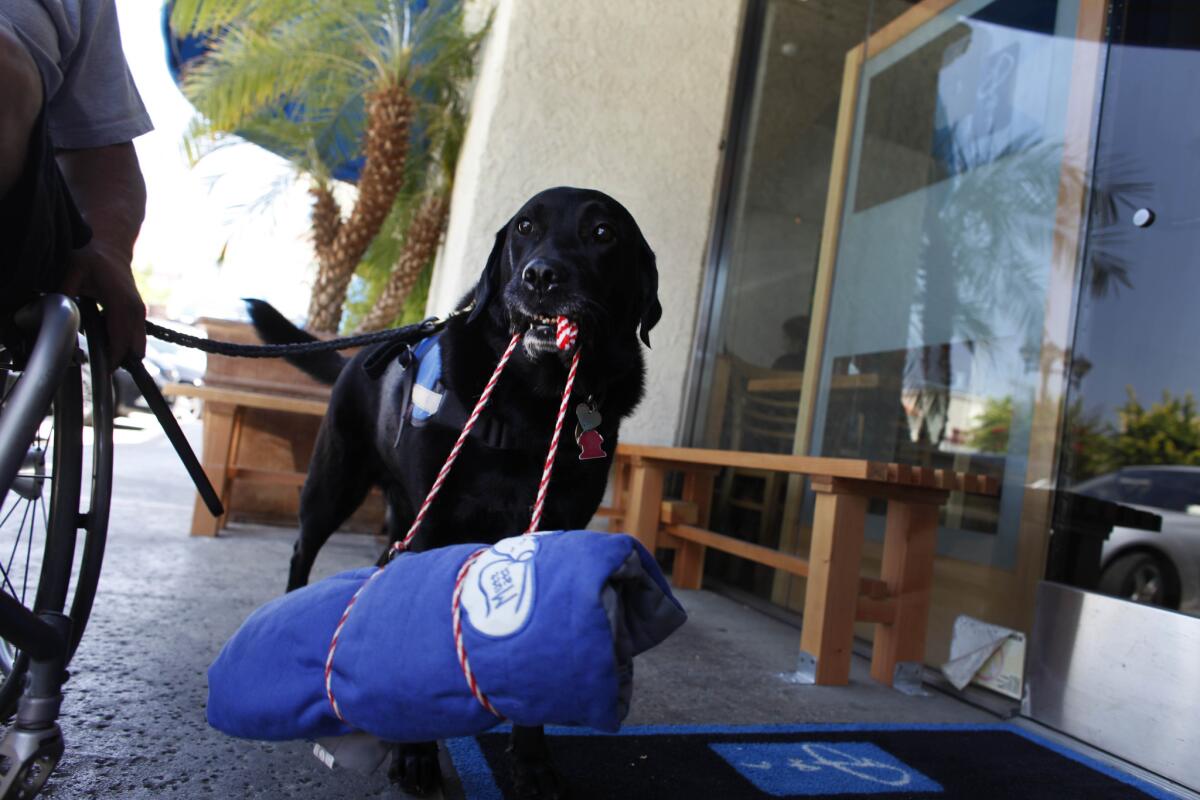Q&A: Rent Watch: Can a disabled tenant have a dog at a ‘no pets’ property?

An 8–year–old service dog carries her own doggie bed when her owner goes out to eat.
- Share via
Question: I am a landlord with a “no pets” policy. Recently, someone in a wheelchair came to look at an open apartment.
He called me later and told me that he was really interested in the apartment, and he mentioned that he has a dog. He didn’t say whether the dog was a service animal or whether the dog helps in any way with his disability.
I know I have to make certain exceptions to my property’s “no pets” rule for disabled individuals when they have service dogs. I think he would be a good tenant, but do I have to allow him to move in with his dog just based on the fact that he is obviously disabled, without him having told me that his dog helps him in relation to his disability?
SIGN UP for the free California Inc. business newsletter >>
Answer: A tenant with a disability may be entitled to a reasonable accommodation so that he can have an equal opportunity to use and enjoy the dwelling. A common reasonable accommodation is one that permits a disabled tenant to have an animal with him at a “no pets” property, if the animal provides the disabled tenant with disability-related assistance.
The idea behind such an accommodation is that the tenant needs to have the animal in order for that disabled tenant to be able to use and enjoy his housing to the same extent as a nondisabled tenant. Before a tenant is entitled to a reasonable accommodation, however, he must make such a request to the landlord. Until he does, a housing provider is under no obligation to provide it.
In this case, you do not know whether this dog is a pet or a service animal, and you should not make assumptions either way. We would suggest that you make your written policy clear to all applicants: You do not allow pets on your property, although you will allow properly-documented service or support animals upon request.
At that point, it is up to the tenant to ask for a reasonable accommodation, assuming that his dog is, in fact, a service or support animal.
You should be aware, though, that there are few hard and fast rules about how a tenant must request a reasonable accommodation. He can make an oral or a written request to you. Also, even if you have a standard “reasonable accommodation request” form, the tenant does not have to use it in order for you to process the request.
The tenant also does not necessarily have to make the request before applying for housing. He can make a request at any point during the tenancy.
This means that even if he brings a dog on to your property without first notifying you, and you respond by giving him a notice that he is in violation of your “no pets” policy, he can then make a request for a reasonable accommodation.
Although this situation often makes landlords angry, you are not allowed to treat this request differently because he made it after he moved in.
Not all tenants understand their rights, and they may be fearful of having to choose between their housing and losing a support or service animal that is important to their health. For that reason, they may not disclose that they have a service animal until after they move in.
Resources: https://www.nolo.com/legal-encyclopedia/renters-rights
Van Deursen is director of Dispute Resolution Programs for Project Sentinel, a Bay Area nonprofit. For more information, contact Project Sentinel at 1-888-324-7468, [email protected], visit www.housing.org or contact your attorney or local housing agency.
ALSO:
When is the rent payment due and is there a grace period?
Does a college student have the right to invite guests to an apartment?
As San Francisco rents soar, tenants still willing to pay for earthquake safety
More to Read
Inside the business of entertainment
The Wide Shot brings you news, analysis and insights on everything from streaming wars to production — and what it all means for the future.
You may occasionally receive promotional content from the Los Angeles Times.










